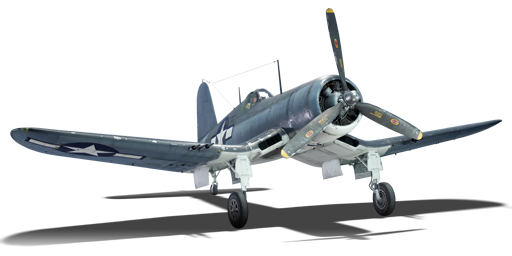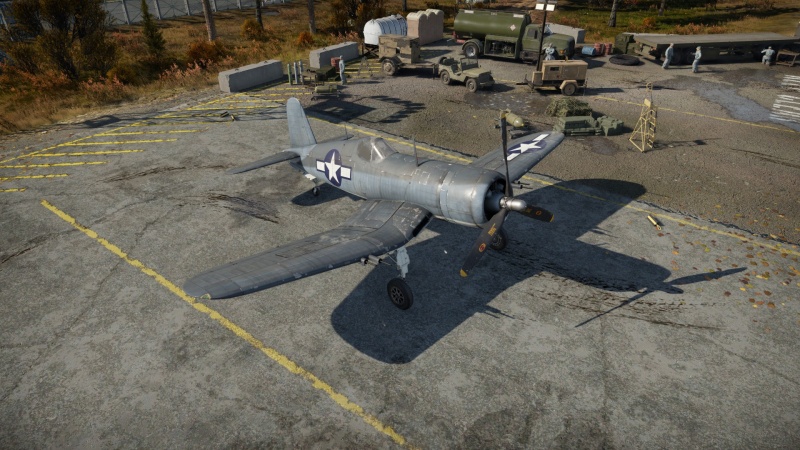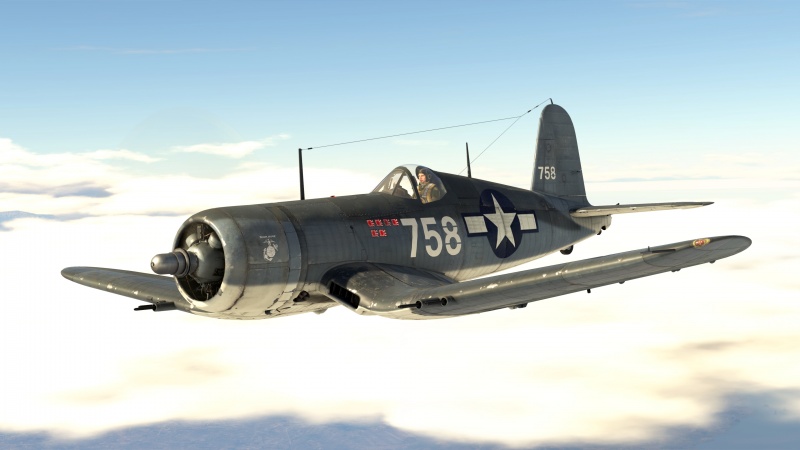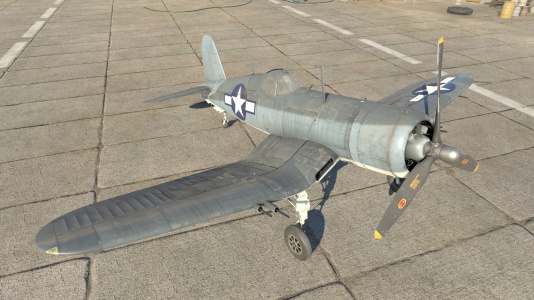Difference between revisions of "F4U-1C"
YamashiroKai (talk | contribs) m (→Pros and cons) (Tag: Visual edit) |
YamashiroKai (talk | contribs) m (→Pros and cons) (Tag: Visual edit) |
||
| Line 155: | Line 155: | ||
* Reasonable rate of climb | * Reasonable rate of climb | ||
* Can use the gear as makeshift airbrakes | * Can use the gear as makeshift airbrakes | ||
| + | * Access to HVAR rockets | ||
'''Cons:''' | '''Cons:''' | ||
| Line 163: | Line 164: | ||
* The recoil from the cannons will yank the nose down quite a bit | * The recoil from the cannons will yank the nose down quite a bit | ||
* Cannons are highly inaccurate to the point of uselessness unless upgraded | * Cannons are highly inaccurate to the point of uselessness unless upgraded | ||
| + | * No bomb load | ||
== History == | == History == | ||
Latest revision as of 09:37, 20 November 2024
| This page is about the American naval fighter F4U-1C. For other versions, see F4U (Family). |
Contents
Description
The F4U-1C Corsair was among one of the rarest variants of the F4U Corsair, with only ~200 made, and was the first Corsair to be armed with cannons. The 1C was essentially an F4U-1D with 4 x 20 mm Hispano guns and gave the aircraft a more potent armament against ground targets and aircraft. As good as the guns seemed on paper, in practice it was very different. American pilots found the guns unreliable and excessive against the lightly armoured Japanese aircraft. Many pilots preferred the M2 Browning machine guns due to their large ammo pool and reliability. Although the new guns made the F4U-1C more deadly, they came at the price of hampering performance with added weight.
The F4U-1C, which has been in War Thunder since the start of the Open Beta Test, is like many of the other Corsairs in-game when it comes to performance. It's incredibly fast and allows the Corsair to excel at Boom and Zoom tactics. With the addition of Hispano cannons, the F4U-1C will easily destroy enemy aircraft with a slight burst and is incredibly effective against ground targets. However, much like in real life, the Hispanos are prone to jamming when stock. Nonetheless, it is the lowest battle rating Corsair with cannons and sets it apart from every Corsair near its battle rating.
General info
Flight performance
| Characteristics | Max speed (km/h at 7,000 m) |
Max altitude (metres) |
Turn time (seconds) |
Rate of climb (metres/second) |
Take-off run (metres) | |||
|---|---|---|---|---|---|---|---|---|
| AB | RB | AB | RB | AB | RB | |||
| Stock | 639 | 618 | 11247 | 23.1 | 24.0 | 12.9 | 12.9 | 250 |
| Upgraded | 697 | 667 | 20.9 | 22.0 | 20.7 | 16.4 | ||
Details
| Features | ||||
|---|---|---|---|---|
| Combat flaps | Take-off flaps | Landing flaps | Air brakes | Arrestor gear |
| ✓ | ✓ | ✓ | X | ✓ |
| Limits | ||||||
|---|---|---|---|---|---|---|
| Wings (km/h) | Gear (km/h) | Flaps (km/h) | Max Static G | |||
| Combat | Take-off | Landing | + | - | ||
| 885 | 730 | 388 | 330 | 252 | ~11 | ~4 |
| Optimal velocities (km/h) | |||
|---|---|---|---|
| Ailerons | Rudder | Elevators | Radiator |
| < 450 | < 450 | < 500 | > 450 |
Survivability and armour
- 3 mm steel - above the front fuel tank
- 8 mm steel - behind pilot's body
- 12.7 mm steel - behind pilot's head
- 38 mm bulletproof glass - armoured windscreen
Modifications and economy
A major advantage of all US cannons are the default belts. They have the highest ratio of high-explosive shells of any tracer belts, only the stealth one is better in that regard.
This makes the ammunition upgrade unnecessary and allows for focused research on the performance upgrades.
As acceleration is one of this aircraft's flaws, initially researching "Compressor" and "Engine" will increase the ability of this aircraft to fly well.
Armaments
Offensive armament
The F4U-1C is armed with:
- 4 x 20 mm AN/M2 cannons, wing-mounted (231 rpg = 924 total)
Suspended armament
The F4U-1C can be outfitted with the following ordnance:
- Without load
- 8 x HVAR rockets
Usage in battles
Loved by its pilots, hated by its enemies, the F4U-1C is an easy to use U.S. Navy fighter, with robust all-round specifications. The Corsair optimally performs with stealth ammunition loaded for best damage output, allowing an experienced pilot to take out several targets before returning to base and reloading. It is best to selectively aim for the most critical parts of an enemy plane if you want to maximise kill efficiency while you're in the sky. A few 20 mm shells to an enemy engine or cockpit will destroy their plane with a little luck. While this may seem easier said than done, diving onto your opponent is almost a guaranteed kill, and if you are unlucky, you still have an incredibly impressive dive speed under your belt to keep you from being a target. While flying this plane, like any U.S. fighter, you'll be in the most danger when you are 'floored' (at a low altitude), since your only escape is diving.
When facing mainly Japanese planes in Realistic Battles and Simulator Battles, do not turn with A6M5s and the like, but to use Boom and Zoom tactics.
The quadruple AN/M2 armament of the Corsair can prove surprisingly effective against all manner of enemy vehicles. Ground target belts will make short work of light armour, but even heavier tanks like the Panther can be dealt with if the pilot attacks the roof from a steep enough angle, though it may take several passes. Diving from one to two thousand metres, as close as possible to the vertical, and hosing down the enemy will reliably cause engine fires and potentially knock out some or all of the turret crew. Using the Corsair's energy retention to regain altitude allows the pilot to repeat this process many times. With enough practice, the F4U-1C's bottomless ammo reserve will allow you to disable or outright destroy several enemies on the ground while maintaining enough energy to take on any aircraft to come your way.
The F4U-1C is an excellent plane in all game modes, however, be aware of the very restrictive cockpit, which makes it extremely difficult to spot targets in Simulator Battles, especially those behind you.
Manual Engine Control
| MEC elements | ||||||
|---|---|---|---|---|---|---|
| Mixer | Pitch | Radiator | Supercharger | Turbocharger | ||
| Oil | Water | Type | ||||
| Not controllable | Controllable Auto control available |
Controllable Not auto controlled |
Controllable Not auto controlled |
Separate | Controllable 3 gears |
Not controllable |
Pros and cons
Pros:
- Great firepower
- Great ammo reserves, >200 rpg
- Great energy retention
- Fast
- High dive speed
- Excellent high-speed instantaneous turn
- Decent sustained turn time
- Reasonable rate of climb
- Can use the gear as makeshift airbrakes
- Access to HVAR rockets
Cons:
- Rather slow/sluggish acceleration
- No rear visibility in the cockpit
- Wings can rip at high-speed turns
- The recoil from the cannons will yank the nose down quite a bit
- Cannons are highly inaccurate to the point of uselessness unless upgraded
- No bomb load
History
The F4U-1C was based on the F4U-1D. The F4U-1D Corsair was designed in order to meet the Navy's requirement for capable carrier-based fighter-bombers. To meet this need, the -1D incorporate a Pratt and Whitney R-2800-8W water injection engine, increasing the engine power and the plane's speed from that of the F4U-1A. This gave it the increased performance necessary to carry a larger armament. Two pylons were added to the center wing section, that could hold 154 gallon fuel tanks, bombs up to 1,000 lbs, or napalm bombs. Because of the ability to carry more fuel externally, the 63 gallon fuel tanks in the wing tips were removed. Later in production, the ability to carry four 5 in rockets under each wing was added. In addition, the propeller diameter was reduced from 13 ft 4 in to 13 ft 1 in.
The F4U-1C was basically the same as the F4U-1D, except in primary armament. The -1D had a primary armament of six .50 in machine guns, as was standard for most Corsair variants. The F4U-1C replaced the .50 in machine guns with four 20 mm cannons. When rocket tabs were added to the F4U-1D, they were also added to the F4U-1C. This allowed it to carry eight 5 in rockets, along with the bombs and/or fuel tanks. All of the F4U-1Cs were fitted with the smaller propeller, with a diameter of 13 ft 1 in, whereas the -1D did not change the propeller size until after production had already started.
| Archive of the in-game description | |
|---|---|
|
The Chance Vought F4U Le Corsaire. The F4U-1C "Corsair" was a single-seater, single-engine carrier-based fighter. The unusual W-shaped wings of the F4U required propeller of a diameter of about four metres. Those were the biggest propellers ever used in a single-engine fighter. Therefore, a conventional wing would have required a significant extension of the landing gear, reducing their strength. So the Chance Vought designers decided to use a new wing design and keep the landing gear at a normal length. Wind tunnel tests proved the new wing design's effectiveness. To reduce weight and improve aerodynamics, the plane's design used spot welding. In 1943, the F4U-1C variant was developed. It differed mainly from the F4U-1A in its armament: instead of six machine guns, the plane had four 20 mm cannons. Because of its low rate of fire, the new Corsair was used primarily to attack ground targets and for nighttime interceptions and took practically no part in aerial fighter combat. The F4U-1C was produced on a relatively small scale. Only 200 were made. | |
Media
- Skins
- Images
See also
External links
References
- Bibliography
- "F4U-1C Vought Corsair", F4U Corsair - The Bent Wing Bird plane site, Retrieved on 28 March 2020.
- "Types of Plane F4U - Variants", F4U Corsair- The Bent Wing Bird plane site, Retrieved on 28 March 2020.
| Chance Vought Aircraft | |
|---|---|
| Fighters | |
| Corsair | F4U-1A · F4U-1A (USMC) · F4U-1C · F4U-1D · F4U-4 · F4U-4B · F4U-4B VMF-214 |
| Float planes | O3U-1 · OS2U-1 · OS2U-3 |
| Attackers | AU-1 |
| Bombers | SB2U-2 · SB2U-3 |
| Jet aircraft | |
| Corsair II | A-7D · A-7E · A-7K |
| Crusader | F8U-2 · F-8E |
| Export | V-156-B1 · V-156-F · ▄Corsair F Mk II · F4U-7 · ▄F-8E(FN) |
| Captured | ▅F4U-1A |
| USA fighters | |
|---|---|
| P-26 Peashooter | P-26A-33 · P-26A-34 · P-26A-34 M2 · P-26B-35 |
| P-36 Hawk | P-36A · Rasmussen's P-36A · P-36C · ○P-36C · P-36G |
| P-39 Airacobra | P-400 · P-39N-0 · P-39Q-5 |
| P-40 | P-40C · P-40E-1 · P-40E-1 TD · P-40F-10 |
| P-43 Lancer | P-43A-1 |
| P-47 Thunderbolt | P-47D-22-RE · P-47D-25 · P-47D-28 · P-47M-1-RE · ⋠P-47M-1-RE · P-47N-15 |
| P-51 Mustang | P-51 · P-51A (Thunder League) · P-51C-10 · P-51D-5 · P-51D-10 · P-51D-20-NA · P-51D-30 · P-51H-5-NA |
| P-63 Kingcobra | P-63A-5 · P-63A-10 · P-63C-5 · ␠Kingcobra |
| Prototypes | XP-55 |
| F2A Buffalo | F2A-1 · Thach's F2A-1 · F2A-3 |
| BF2C | BF2C-1 |
| F3F | F3F-2 · Galer's F3F-2 |
| F4F Wildcat | F4F-3 · F4F-4 |
| F4U Corsair | F4U-1A · F4U-1A (USMC) · F4U-1D · F4U-1C · F4U-4 · F4U-4B · F4U-4B VMF-214 · F2G-1 |
| F6F Hellcat | F6F-5 · F6F-5N |
| F8F Bearcat | F8F-1 · F8F-1B |
| Other countries | ▃Ki-43-II · ▃Ki-61-Ib · ▃A6M2 · ▃Bf 109 F-4 · ▃Fw 190 A-8 · ▃Spitfire LF Mk IXc |







